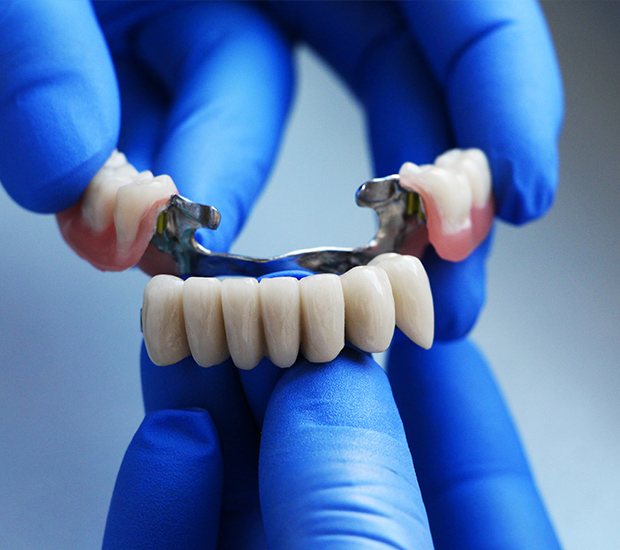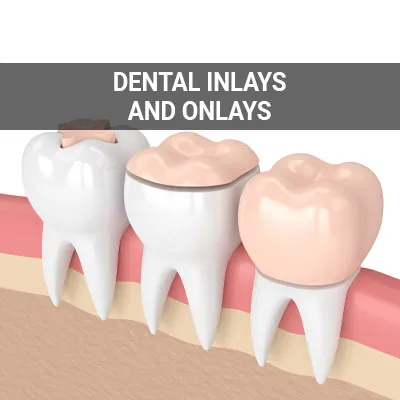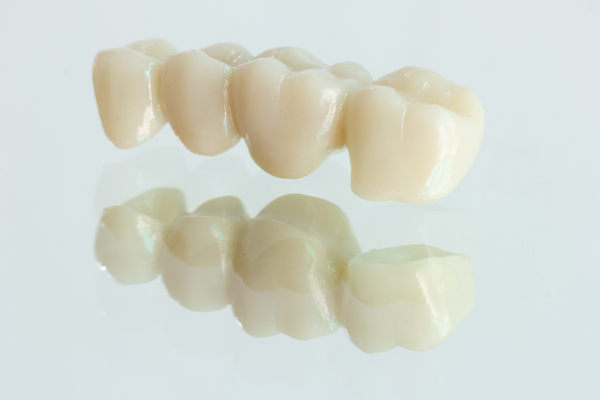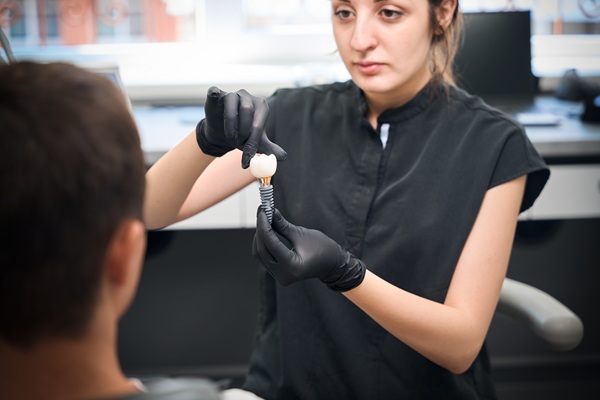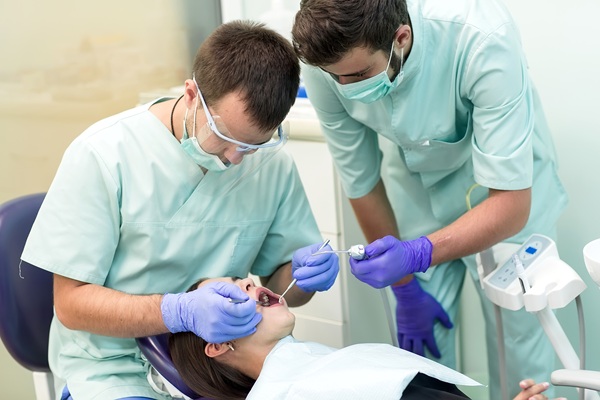Dental Bridges Alpharetta, GA
A dental bridge is a tooth replacement option that consists of artificial teeth attached to a frame that can be fit onto a crown over abutting natural teeth or implants. Many patients may consider a dental bridge among other teeth replacement options. The right choice may come down to an option that offers comfort and a natural appearance, which is why many patients choose dental bridges.
At Windward Parkway Dentistry, we offer dental bridges to patients in Alpharetta and the surrounding area. After a thorough evaluation and review of medical records, our dentist explains available teeth replacement options and makes recommendations for an optimal treatment plan. We work with top dental labs to create dental bridges that fit well and look good.
Replacing missing teeth is not just a cosmetic matter. It is essential to good overall health to have a full mouth of adequately functioning teeth. Call us at (770) 814-6224 to make an appointment and learn how our dentists can help.
How Dental Bridges Work
A bridge consists of artificial teeth replacements that rest on a frame in the mouth. The frame is then attached to teeth on either side. If there are natural teeth, they will need to receive crowns or implants to support the bridge. We will bond the dental bridge permanently using dental cement. A dentist can remove it and place a new one if the bridge breaks or wears out.
Most commonly, dental bridges replace between one and three adjacent missing teeth. Sometimes, bridges can replace a greater number and even a full mouth. This typically depends on the availability of strong natural teeth or a strong jaw bone that can support several implants. An article by the Mayo Clinic points out that a bone graft can enable patients with bone loss to obtain implants.
After a short adjustment period, patients with bridges are typically able to eat and speak comfortably and naturally. Our dentists help select replacement teeth that blend in with the color and shape of the remaining natural teeth. This is important, not just for appearance but also to ensure a proper bite and spacing.
“After a short adjustment period, patients with bridges are typically able to eat and speak comfortably and naturally.”
Caring for and Adjusting to Dental Bridges
WebMD stresses the importance of good oral hygiene for keeping a dental bridge in good condition. It is crucial that patients keep up the recommended routine of brushing, flossing, and using mouthwash. The dental team will demonstrate the right technique for flossing around the crowns and bridge to prevent bacteria from flourishing there. It is also essential to see a dentist as soon as possible upon noticing any problems with the bridge. This can stop minor issues from snowballing.
Patients may experience minor discomfort the first few days after the placement of a dental bridge as they adjust. We recommend eating softer foods and avoiding sugary and acidic foods and beverages to keep them in good condition during the adjustment period. Over time, patients will become accustomed to the bridge and can resume normal diet and activities, following a strict hygiene routine.
“Continue the recommended routine of brushing, flossing, and using mouthwash.”
Types of Dental Bridges
There are four main types of dental bridges, and choosing the right one for any particular person depends on the individual's oral health and needs. Here is some key information about each type:
- Traditional. This type of bridge attaches to crown-covered teeth or implants on both sides. They usually consist of either ceramic or porcelain attached to metal. Recently, the use of a ceramic called zirconia has become popular due to this material’s durability and natural look.
- Maryland. This bridge, also referred to as a resin-bonded bridge, is supported by a flat meta or porcelain “wing” that is attached to the backs of abutting teeth. It is less sturdy than traditional bridges. For this reason, it usually replaces front teeth, which take less strain.
- Cantilevered. This bridge only has support on one side, which places a lot of strain on the one supporting tooth. Therefore, dentists avoid placing it in high-stress areas such as the back of the mouth.
- Implant-supported. This type of bridge is true to its name. The bridge is supported by implants that are already present in the jaw bone. They are considered to be the strongest, most stable type of bridge.
“There are three main types of dental bridges, and choosing the right one for any particular person depends on the individual’s oral health and needs.”
Check out what others are saying about our dental services on Yelp: Dental Bridges in Alpharetta, GA
Dental Bridges Versus Dentures
One alternative to a dental bridge is a set of partial dentures. These can replace one or a few teeth similarly. However, unlike dental bridges, the dentures are not permanently placed but are removed for cleaning and sleeping.
Eating and speaking can feel more comfortable with dental bridges than with dentures, as dental bridges are more firmly rooted in place. Furthermore, you must remove dentures to clean them, whereas you can brush dental bridges like natural teeth. However, according to the American Dental Association, cleaning dental bridges may require extra care to ensure the health of the gum beneath the replacement teeth.
“Dental bridges are more firmly rooted in place than dentures, which can make eating and speaking easier.”
Questions Answered on This Page
Q. What are the differences between dental bridges and dentures?
Q. What are the benefits of dental bridges?
Q. How can someone benefit from a dental bridge?
Q. How does one maintain a dental bridge?
Q. What types of dental bridges are available?
People Also Ask
Q. How can a dentist replace missing teeth?
Q. What is restorative dentistry?
The Benefits of Dental Bridges
Dental bridges can be an effective treatment for missing teeth. Our team recommends this option to patients who are candidates and want to restore the form and function of their mouths. These are a few of the benefits:
- Emulate Natural Teeth: The porcelain teeth on a dental bridge look, feel, and function like natural teeth. They are stable in the mouth. Therefore, they are similar to natural teeth when eating and speaking.
- Allow Brushing: Patients can clean dental bridges in the mouth, unlike with removable dentures, meaning they can brush and floss like normal. Maintaining this familiar process can make care more manageable.
- Provide Value: Compared to implants, dental bridges are less expensive. They may cost more than removable dentures. Many patients find that they provide a healthy balance between cost and effectiveness.
- Perform Effectively: Missing teeth may produce embarrassment and make speaking and eating more challenging. They may also slowly erode the jawbone over time. A dental bridge is an effective way to overcome these issues.
“Dental bridges can be an effective treatment for missing teeth.”
Frequently Asked Questions
Q. How is a dental bridge different from dentures?
A. Dentures require removal every day, while a bridge stays in the mouth permanently for the duration of its lifespan. On the one hand, bridges tend to offer a better fit and a more natural feeling. On the other hand, fitting the dentures does not require additional procedures such as a crown or implant placement.
Q. How long can I expect my dental bridge to last?
A. Dental bridges usually last between 10 and 15 years. Taking good care of the bridge and seeing a dentist on a regular basis can extend this period further.
Q. Is it normal to have tooth sensitivity after getting a dental bridge?
A. Tooth sensitivity is common after bridge placement. It usually goes away after a few weeks. In the meantime, it can help to avoid very hot or cold foods. The American Dental Association also recommends limiting acids, which can be in some types of mouthwash. Ask a dentist about alternative products.
Q. When do I need to see a dentist about problems with my dental bridge?
A. Some discomfort immediately after placement is usually normal; however, contact a dentist if pain or sensitivity persists or worsens. Damage to the bridge or crowns also needs prompt, professional attention.
Q. Why does my dental bridge keep coming loose?
A. If a dental bridge keeps loosening or falling out, the most common reason is decay in the supporting teeth. Other causes could include gum disease. Whatever the reason, a loose bridge is an important reason to call our office right away.
Dental Terminology
Helpful Related Links
- American Dental Association (ADA). Glossary of Dental Clinical Terms. 2024
- American Academy of Cosmetic Dentistry® (AACD). Home Page. 2024
- WebMD. WebMD’s Oral Care Guide. 2024
About our business and website security
- We accept the following payment methods: Cash, Check, Discover, MasterCard, and Visa
- We serve patients from the following counties: Fulton County
- We serve patients from the following cities: Alpharetta, Bethany Crossing, Herring Township, and Milton
- Norton Safe Web. View Details
- Trend Micro Site Safety Center. View Details
Back to top of Dental Bridges
